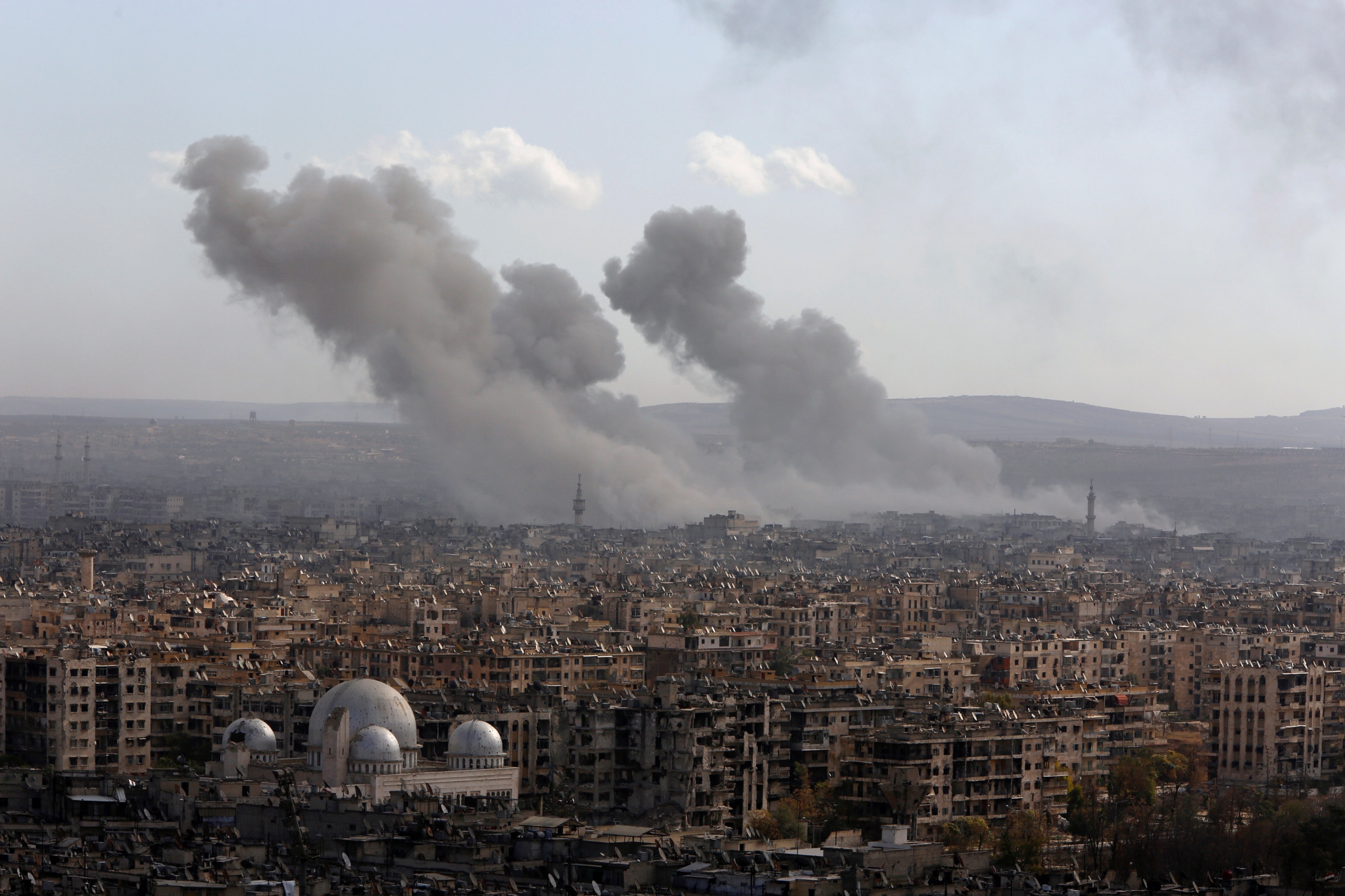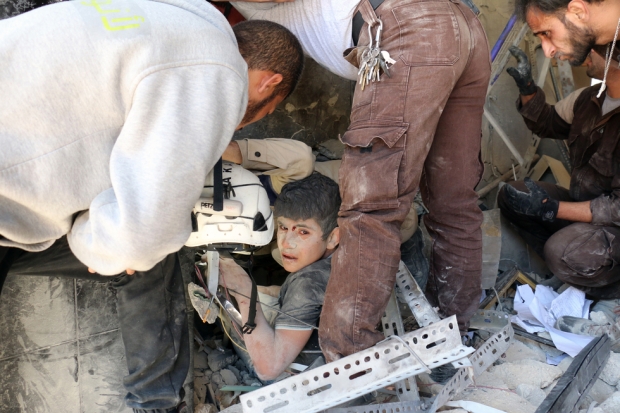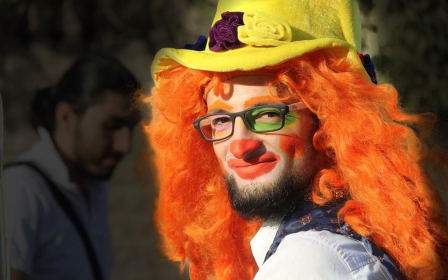Russia ready for US deal on 'complete withdrawal' of Aleppo rebels

Russia has said it is ready for talks with the United States to agree a "complete withdrawal" of all rebels from eastern Aleppo, as Syrian government forces reportedly stormed a crucial district adding to their lightning advances across rebel territory.
Speaking at a conference in Rome on Saturday, Russia's foreign minister, Sergei Lavrov, said his US counterpart John Kerry had offered new proposals to end the battle for Aleppo, and he was immediately ready to discuss them.
"Moscow is ready to immediately send our military experts and diplomats to Geneva to work out joint actions with our US colleagues in line with the American proposals," he said, adding they would "ensure the withdrawal of all militants without exception from eastern Aleppo, and provide unimpeded humanitarian supplies to the city’s residents".
"John Kerry passed on to us proposals from Washington that are in line with the suggestions from Russia’s experts," he was quoted by Russian state media as saying. “It must not be a meeting for the sake of a meeting. It is necessary to agree on a detailed timeline of steps.”
The US has not yet disclosed its plans as reported by Lavrov. Russian and US diplomats are due to resume talks in Geneva next week. Kerry insisted on Friday that "diplomacy is still alive" and that "nobody is waiting" for the inauguration of Donald Trump as president in January.
The talks came as Syrian forces continued to press their advantage in the city. The Syrian Observatory for Human Rights said Syrian troops had seized the Tariq al-Bab district from rebels, opening up a road linking the government-controlled west of the city to its international airport.
Observatory head Rami Abdel Rahman, who is based in the UK, said the government was "comfortably in control of half of former rebel territory in the city's east".
Within hours of Lavrov's comments, Zakaria Malahifji, the head of the political office of the Aleppo-based Fastaqim rebel faction, said there would be no withdrawal.
"The military commanders in Aleppo said 'we will not leave the city. There is no problem with corridors for civilians to leave, but we will not'," he told the Reuters news agency.
The UN's envoy to Syria, Staffan de Mistura, meanwhile said he hoped "some type of formula" could be found to avoid a "terrible battle" for the city.
"The fact is that Aleppo is not going to stay [survive] that long," he said.
"I was feeling it would be a terrible battle ending by Christmas-New Year. I hope the battle will not take place, that there will be some type of formula."
However, the European Union's foreign affairs policy chief, Federica Mogherini, said the wider Syrian war would carry on regardless.
"I'm convinced the fall of Aleppo will not end the war," she said. "You can win a war but you can lose the peace.
"Who is interested in winning a war in Syria and getting at a price a country that is divided, armed, full of terrorists... isolated in the international community?"
The Rome meeting also follows talks in Ankara between rebels and Russian representatives, which were brokered by the Turkish government.
However, a senior Syrian opposition official on Friday accused Moscow of using the meeting to "procrastinate" rather than negotiate.
"There is severe procrastination by the Russians," the official told Reuters, speaking on condition of anonymity, adding there was "absolutely no seriousness" about finding a negotiated settlement.
AFP's correspondent in east Aleppo said ferocious clashes could be heard in the Tariq al-Bab district on Friday, where government forces began their advance earlier this week.
Tariq al-Bab has been under heavy bombardment and air attack for months, with many streets reduced to rubble.
The capture of the area came after ferocious clashes that sent civilians flooding out of the adjacent district of al-Shaar.
The AFP correspondent saw only a few rebel fighters in the district on Friday as the government advanced. Shops and bakeries were shut, and market stalls shattered by heavy shelling.
More than 300 civilians have been killed in east Aleppo since the government, backed by Russia, resumed its offensive on 15 November.
READ: Russia, the middleman keeping Turkey and Syria apart
Tens of thousands of people have fled the fighting, either to government-held areas, Kurdish districts or within rebel territory. The UN children's organisation Unicef estimated 20,000 children were among those forced from their homes.
"What is critical now is that we provide the immediate and sustained assistance that these children and their families desperately need," spokesman Christophe Boulierac said.
"It's a race against time, as winter is here and conditions are basic."
Earlier on Friday, anti-government fighters had rolled back government gains in Sheikh Saeed on Aleppo's southeastern outskirts.
Sheikh Saeed borders the last remaining parts of Aleppo still in rebel hands - a collection of densely populated residential areas where thousands have sought refuge from advancing government forces.
Hundreds of members of Syria's elite Republican Guard and Fourth Division arrived in Aleppo on Friday in preparation for street fighting in those districts, according to the Observatory.
Russia on Saturday said it was sending a force of mine-clearers to the city, to clear "eastern Aleppo from explosive devices left by terrorists".
Moscow has proposed setting up four humanitarian corridors into east Aleppo.
"We have informed the UN in New York and Geneva that there is no longer a problem with the delivery of humanitarian cargo to eastern Aleppo," said Lavrov on Friday. He said the UN was forming a plan and approval from Syrian authorities remained essential.
Moscow has announced several humanitarian pauses in Aleppo to allow civilians to flee, but until the recent escalation only a handful did so.
East Aleppo residents have been wary of previous such offers because of Russia's support for the government.
Middle East Eye propose une couverture et une analyse indépendantes et incomparables du Moyen-Orient, de l’Afrique du Nord et d’autres régions du monde. Pour en savoir plus sur la reprise de ce contenu et les frais qui s’appliquent, veuillez remplir ce formulaire [en anglais]. Pour en savoir plus sur MEE, cliquez ici [en anglais].





